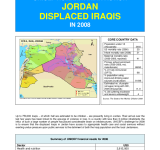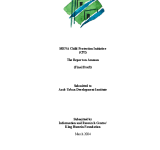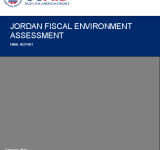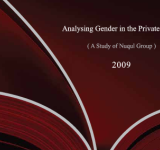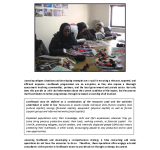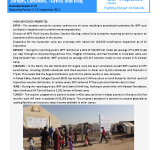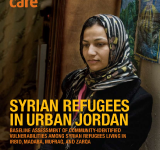assessment
In 2006;; the Sultanate of Oman undertook a project that aimed to support the implementation of the country’s vision towards conservation of biological diversity in the Sultanate of Oman. This report serves as an “evaluation and assessment of capacity building in the field of traditional knowledge related to biodiversity.” The report aims to describe the state of traditional knowledge on biodiversity in Oman;; assess capacity-building requirements in relation to traditional knowledge;; and provide a set of recommendations with a strategy for the protection and maintenance of traditional knowledge on biodiversity conservation. Various topics related to biodiversity are covered;; including irrigation;; tree cultivation;; crop improvement;; livestock management;; and soil and water conservation. The methodology used depends on three sources of information;; including a review of secondary data;; in-depth interviews;; and a participatory workshop.
This report aims to review the status of children in Greater Amman and to conduct a capacity assessment of key institutions addressing children’s issues. Various issues are examined;; covering areas such as health;; education;; and socio-economic characteristics. This report also reviews the status of disadvantaged children;; including working children;; orphans;; refugees;; and children with disabilities;; in order to identify vulnerabilities and risk factors specific to them. Finally;; this report assesses the capacity of selected institutions addressing children’s issues in Greater Amman and proposes phased capacity building programs based on the findings of the assessment.
The assessment report is a final product of the Asia and Middle East Economic Growth Best Practices project (AMEG);; which is designed to support USAID missions in developing effective and efficient economic growth programs that address technical and strategic challenges. The report provides an introduction to Jordan's macroeconomic performance and structure and examines the field assessment's key lines of inquiry such as fiscal environment;; taxation;; customs and trade facilitation;; the energy sector;; policy analysis and political economic environment. It identifies the structure and performance of each inquiry and adds policy;; administrative;; and institutional environment;; and its challenges and opportunities.The report's concluding section outlines key challenges and opportunities;; and offers recommendations. Some of the findings include Jordan's lack of robust forum for soliciting and integrating input on economic policy issues from key stakeholders or the wider public and lack of institutional capacity to develop macroeconomic models. The report suggests facilitating national dialogue and consensus building on economic policy issues and building capacity to integrate stakeholder input.
جاءت هذه الدراسة لغايات التعرف إلى واقع إدماج النوع الاجتماعي في القطاعين العام والخاص. وتعد هذه الدراسة الاولى في مجال تحليل واقع ادماج النوع الاجتماعي في القطاع الخاص ممثل بالادارة الاقليمية لمجموعة شركات نقل في المملكة الاردنية الهاشمية بهدف تحليل أبعاد إدماج منظور النوع الاجتماعي من خلال محور الموارد البشرية و المحور المؤسسي. ولتحقيق ذلك جمعت الدراسة بين المنهجين الكمي والنوعي بحيث استخدم منهج المسح الاجتماعي لرصد البيانات الكمية وتحليلها من خلال اجراء مسح شامل لكافة العاملين في الادارة القليمية للمجموعة والبالغ عددهم 110 عامل وعاملة. وتم اعتماد الاستبانة كأداة لجمع المعلومات من المبحوثين بالاضافة الى البيانات الواردة في السجلات الرسمية للمؤسسة. أما فيما يتعلق بالتحليل على المستوى المؤسسي;; فقد تم استخدام المنهج النوعي من خلال إجراء المقابلات المعمقة مع عدد من العاملين والعاملات والذين تم اختيارهم باستخدام أسلوب العينة القصدية الطبقية .
Assessing refugee situations and developing strategies are crucial in ensuring a relevant;; targeted;; and efficient response. Livelihoods programmes are no exception;; as they also require a thorough assessment involving communities;; partners;; and the local government and private sector. Not only does this provide us with vital information about the current condition of the region;; but the process itself contributes to better programmes through increased ownership of all involved. UNHCR Jordan developed a quality strategy using their internal resources and networks. This is a story about their experience and the lessons learnt in the process.
During the reporting period;; World Food Programme (WFP) distributed a total of 340;;000 hot meals (an average of 52;;000 meals per day) through its implementing partners TUA;; Thaghar Al Madina;; and Radi Shedifat in Al Za'atari camp and King Abdullah Park. In addition;; WFP provided an average of 4;;213 welcome meals to new arrivals in Al Za'atari Camp. The following report details such endeavors.
This report is a baseline assessment of community-identified vulnerabilities among Syrian refugees living in Amman;; Irbid;; Madaba;; Mufraq;; and Zarqa. The purpose of this report is to identify urban Syrian refugees’ current coping mechanisms and any gaps in services available to Syrian refugees in Jordan. The research methodology is both qualitative and participatory in design;; drawing from the UNHCR tool for Participatory Assessment in Operations. This report presents only the data from household interviews;; baseline assessment;; and the follow-up focus groups conducted with community members. The number of households surveyed was 240;; with a total number of 1;;476 household members and 89 focus group participants representing 534 household members. The report proposed general recommendations and interventions to deal with the main highlighted challenges (cash assistance;; strengthening community links;; vocational training;; physical activities ...etc).
